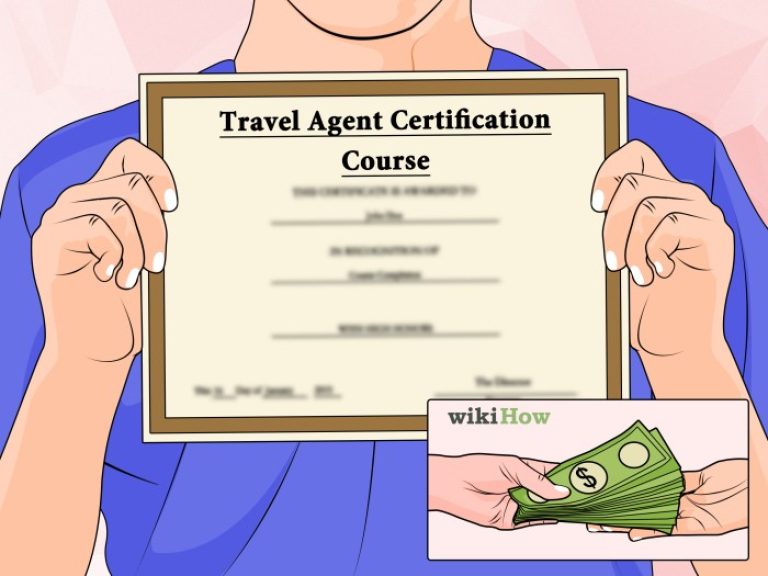How do you become a travel agent? This question opens the door to a fascinating career path filled with adventure, helping people plan their dream vacations. It’s a field blending business acumen, people skills, and a passion for travel. This guide will walk you through the education, licensing, skills, and marketing strategies needed to succeed in this exciting industry.
From choosing the right educational path and understanding legal requirements to building a client base and staying updated on industry trends, we’ll cover everything you need to know. Whether you dream of working for a large agency or starting your own independent business, this comprehensive overview will equip you with the knowledge to navigate your journey.
Finding Employment or Starting Your Own Business
So, you’re ready to dive into the travel industry. Great! Now you need to decide whether you want to work for an established agency or strike out on your own. Both paths offer unique opportunities and challenges. Let’s explore your options.
Applying for Travel Agent Positions with Established Agencies
Securing a position with a reputable travel agency provides valuable experience, established client networks, and a supportive infrastructure. The application process typically involves submitting a resume and cover letter highlighting relevant skills and experience, followed by interviews. Strong communication, sales, and customer service skills are crucial. Many agencies prefer candidates with some travel industry experience, even if it’s just volunteer work or personal travel planning.
Networking within the industry can also significantly improve your chances. Consider attending travel industry events or connecting with professionals on LinkedIn.
Starting Your Own Independent Travel Agency
Launching your own agency offers greater autonomy and potential for higher earnings, but it requires significant upfront investment and entrepreneurial drive. A well-structured business plan is essential. This plan will guide your initial steps and secure funding if needed.
Advantages and Disadvantages of Working for an Agency vs. Self-Employment
| Feature | Working for an Agency | Self-Employment |
|---|---|---|
| Income | Stable salary, benefits (potentially) | Variable income, dependent on sales |
| Risk | Lower risk, established infrastructure | Higher risk, requires significant investment |
| Autonomy | Less autonomy, follow agency guidelines | High autonomy, set your own rules |
| Client Base | Established client base | Need to build your own client base |
| Marketing | Agency handles marketing | Responsible for all marketing efforts |
Sample Business Plan for a New Travel Agency
A comprehensive business plan is crucial for securing funding and guiding your agency’s growth. Here’s a simplified example:
Executive Summary
[This section would briefly describe the agency’s mission, target market, and financial projections. For example: “Escape Adventures Travel Agency will specialize in eco-tourism packages for young professionals aged 25-40, focusing on sustainable and adventurous travel experiences in South America. We project profitability within the first two years based on conservative market share estimates and strong online marketing.”]
Market Analysis
[This section would analyze the target market, competition, and market trends. For example: “The eco-tourism market is experiencing significant growth, driven by increased consumer awareness of environmental issues. Our competitors include established agencies offering similar packages, but we differentiate ourselves through our focus on South America and a strong emphasis on personalized experiences.”]
Products and Services
[This section would detail the specific travel packages offered. For example: “We will offer curated itineraries for various destinations in South America, including trekking in Patagonia, exploring the Amazon rainforest, and cultural immersion experiences in Peru. We will also offer add-on services such as travel insurance and visa assistance.”]
Marketing and Sales Strategy
[This section would Artikel how the agency will reach its target market. For example: “Our marketing strategy will focus on online channels, including social media marketing, search engine optimization (), and partnerships with travel bloggers. We will also attend relevant travel fairs and events.”]
Financial Projections
[This section would include projected income statements, balance sheets, and cash flow statements for the next three to five years. This would include startup costs, operating expenses, revenue projections, and profitability analysis. Real-life examples of successful start-up costs for similar businesses could be cited here, referencing publicly available data on similar travel agencies.]
Building a Client Base and Marketing Strategies
Building a successful travel agency requires more than just expertise in planning trips; it needs a strong client base. This involves a multifaceted approach encompassing both online and offline strategies, leveraging various marketing channels to reach your target audience effectively. Consistent effort and a well-defined marketing plan are crucial for sustainable growth.
Effective Strategies for Building a Client Base
Establishing a solid client base involves a combination of proactive outreach and relationship building. Networking within your community, attending industry events, and collaborating with other businesses (like hotels or tour operators) can generate valuable referrals. Providing exceptional customer service, fostering strong relationships, and encouraging repeat business and referrals are vital for long-term success. Offering exclusive deals or loyalty programs further incentivizes clients to return and recommend your services.
Building a professional website and optimizing it for search engines is essential for online visibility.
Social Media and Digital Marketing for Client Attraction
Social media platforms like Instagram, Facebook, and TikTok offer powerful tools for showcasing your travel expertise and engaging potential clients. Visually appealing content, such as high-quality photos and videos of stunning destinations, is key. Running targeted advertising campaigns on these platforms allows you to reach specific demographics interested in travel. Utilizing relevant hashtags and engaging with followers through comments and direct messages helps build brand awareness and fosters a sense of community.
Influencer marketing, collaborating with travel bloggers or social media personalities, can significantly boost your reach and credibility. Content marketing, such as creating blog posts or travel guides, provides valuable information to potential clients and positions you as an expert.
Examples of Successful Marketing Campaigns
A successful campaign by a small travel agency might involve partnering with a local photographer to create stunning visuals for Instagram, showcasing unique aspects of their specialized destination. They could then run targeted ads on Instagram and Facebook, focusing on a specific demographic (e.g., young professionals interested in adventure travel). Another example could be a travel agency offering a free travel consultation in exchange for email sign-ups, building an email list for future marketing efforts.
A larger agency might leverage email marketing to promote exclusive deals to their existing client base and run contests or giveaways on social media to increase engagement and attract new clients.
Potential Marketing Channels Categorized by Cost
Choosing the right marketing channels depends on your budget and target audience. A balanced approach often yields the best results.
Below is a list of potential marketing channels categorized by cost:
| High-Cost | Medium-Cost | Low-Cost |
|---|---|---|
| Print advertising in travel magazines | Paid social media advertising | Content marketing (blogging, social media posts) |
| Television or radio commercials | Search engine optimization () | Email marketing |
| Sponsoring travel events | Public relations (press releases) | Networking events |
| Trade show participation | Influencer marketing | Referral programs |
Staying Updated in the Travel Industry

The travel industry is incredibly dynamic. New destinations emerge, airlines adjust routes and pricing, hotels renovate, and regulations change constantly. To thrive as a travel agent, continuous learning and adaptation are not just beneficial—they’re essential for staying competitive and providing clients with the best possible service. Failing to keep up with these changes can lead to outdated advice, missed opportunities, and ultimately, dissatisfied clients.Staying current requires a proactive approach, combining diverse resources and a dedicated commitment to ongoing professional development.
This isn’t just about reading industry news; it’s about actively engaging with the evolving landscape and integrating new knowledge into your business practices.
Industry Publications and Resources
Several key publications and online resources provide up-to-date information on travel trends, technological advancements, and regulatory changes. Subscribing to relevant newsletters and regularly checking reputable websites is crucial. These resources often offer in-depth analysis, expert insights, and practical advice that can directly impact your work. For example, publications like
- Travel Weekly* or
- Travel Agent Central* offer news, features, and analysis specific to the travel agent profession. Websites like the IATA (International Air Transport Association) provide vital information on airline regulations and industry standards.
Conferences and Workshops
Attending industry conferences and workshops provides invaluable networking opportunities and access to the latest information directly from industry leaders. These events often feature presentations on emerging trends, technological innovations, and best practices. Networking with other professionals allows for the exchange of ideas, insights, and potential collaborations. Imagine attending a conference focused on sustainable tourism; you might discover new eco-friendly tour operators to partner with, broadening your service offerings and appealing to an increasingly environmentally conscious clientele.
Technological Advancements
The travel industry is rapidly adopting new technologies. Staying ahead of the curve requires familiarizing yourself with Global Distribution Systems (GDS), Customer Relationship Management (CRM) software, and various booking platforms. These tools streamline operations, enhance client communication, and allow for more efficient management of bookings and itineraries. For instance, mastering a GDS like Amadeus or Sabre allows access to a wider range of flight and hotel options, giving you a competitive edge when crafting itineraries.
Sample Professional Development Schedule
Maintaining a regular schedule for professional development is crucial. A sample schedule might look like this:
| Activity | Frequency | Notes |
|---|---|---|
| Read industry news (Travel Weekly, etc.) | Daily/Weekly | Stay abreast of current events and trends. |
| Attend webinars/online courses | Monthly | Focus on specific skills or areas needing improvement. |
| Network with other travel professionals | Quarterly | Attend industry events or join online forums. |
| Attend a larger industry conference/trade show | Annually | Immerse yourself in the latest industry developments. |
This schedule is a suggestion; it should be tailored to individual needs and priorities. The key is consistency and a commitment to continuous learning.
Regulatory Updates
Keeping abreast of changes in travel regulations is paramount. These changes can affect visa requirements, passport validity, health advisories, and other crucial aspects of travel planning. Regularly checking government websites, such as those of the Department of State (for US citizens) or equivalent agencies in other countries, is vital. Failure to stay informed can lead to significant issues for your clients and potential legal liabilities for your business.
For example, a change in visa requirements for a particular country could render a meticulously planned itinerary invalid, causing considerable inconvenience and frustration for your clients.
Understanding Travel Products and Services

Becoming a successful travel agent requires a deep understanding of the various travel products and services available, as well as the intricacies of booking and managing travel arrangements. This knowledge is crucial for providing clients with the best possible travel experience and for ensuring smooth transactions.
Types of Travel Products, How do you become a travel agent
Travel products encompass a wide range of options catering to diverse travel styles and budgets. Flights, hotels, tours, and cruises are the core components, each offering unique characteristics and considerations. Flights provide transportation between destinations, with various classes (economy, business, first) and airlines offering different levels of service and amenities. Hotels offer accommodation, ranging from budget-friendly options to luxury resorts, each with its own amenities and services.
Tours offer pre-packaged itineraries, including transportation, accommodation, and guided sightseeing, providing a structured travel experience. Cruises offer a unique combination of transportation and accommodation, with onboard amenities and excursions to various destinations. Understanding the nuances of each product is essential for effectively matching client needs with appropriate options.
Booking Travel Arrangements
Booking travel arrangements involves a multi-step process that requires attention to detail and a strong understanding of fares, policies, and contracts. Flights are usually booked through online booking platforms or directly with airlines, requiring careful consideration of flight times, baggage allowances, and cancellation policies. Hotel bookings can be made through online travel agencies (OTAs), hotel websites, or directly with the hotel, involving consideration of room types, amenities, and cancellation policies.
Tour bookings often involve working with tour operators, understanding itinerary details, inclusions, and exclusions. Cruise bookings require selecting a cruise line, ship, itinerary, and cabin type, paying close attention to onboard amenities and excursion options. Contracts and policies are crucial; understanding terms and conditions is vital for avoiding misunderstandings and potential disputes.
Booking Platforms and Their Features
Several booking platforms cater to different needs and preferences. Online Travel Agencies (OTAs) like Expedia, Booking.com, and Kayak offer a wide selection of flights, hotels, and packages, often with competitive pricing and user-friendly interfaces. Global Distribution Systems (GDSs) like Amadeus, Sabre, and Galileo are primarily used by travel professionals to access a wider range of inventory and pricing options.
Direct booking through airlines and hotels often provides greater flexibility and potentially better customer service, though it might not always offer the most competitive prices. Each platform offers unique features, such as price comparison tools, loyalty programs, and customer support, which should be carefully considered when choosing a booking method.
Travel Insurance Options
Travel insurance provides financial protection against unforeseen events during a trip. Different policies offer varying levels of coverage.
| Type of Coverage | Description | Example Coverage | Considerations |
|---|---|---|---|
| Trip Cancellation | Covers costs associated with canceling a trip due to unforeseen circumstances. | Medical emergencies, natural disasters, job loss. | Check specific exclusions and pre-existing conditions. |
| Medical Expenses | Covers medical costs incurred during the trip. | Hospitalization, doctor visits, emergency medical evacuation. | Ensure sufficient coverage for medical emergencies abroad. |
| Baggage Loss/Delay | Covers the cost of lost or delayed luggage. | Replacement of lost items, reimbursement for essential purchases. | Understand limitations on coverage amounts and item types. |
| Emergency Assistance | Provides assistance with emergencies, such as medical evacuation or repatriation. | 24/7 helpline, emergency medical transport, legal assistance. | Consider the level of assistance provided and accessibility. |
Becoming a successful travel agent requires dedication, a passion for travel, and a commitment to continuous learning. By combining the right education and training with strong interpersonal and organizational skills, you can build a thriving career helping others experience the world. Remember, the travel industry is constantly evolving, so staying updated on trends and technologies is key to long-term success.
So, are you ready to embark on this exciting adventure?
Top FAQs: How Do You Become A Travel Agent
What is the average salary for a travel agent?
Salaries vary greatly depending on experience, location, and employer. Entry-level positions may offer lower pay, while experienced agents or those with their own businesses can earn significantly more.
Do I need a college degree to become a travel agent?
No, a college degree isn’t always required, but relevant certifications and training are highly beneficial. Many successful agents have gained experience through apprenticeships or on-the-job training.
How long does it take to become a travel agent?
The timeframe depends on your chosen educational path. Some certifications can be completed in a few weeks or months, while others may require more extensive training.
What are the best travel agent certifications?
Several reputable organizations offer certifications. Research different programs to find one that aligns with your goals and experience level. Look for certifications recognized within your region.

